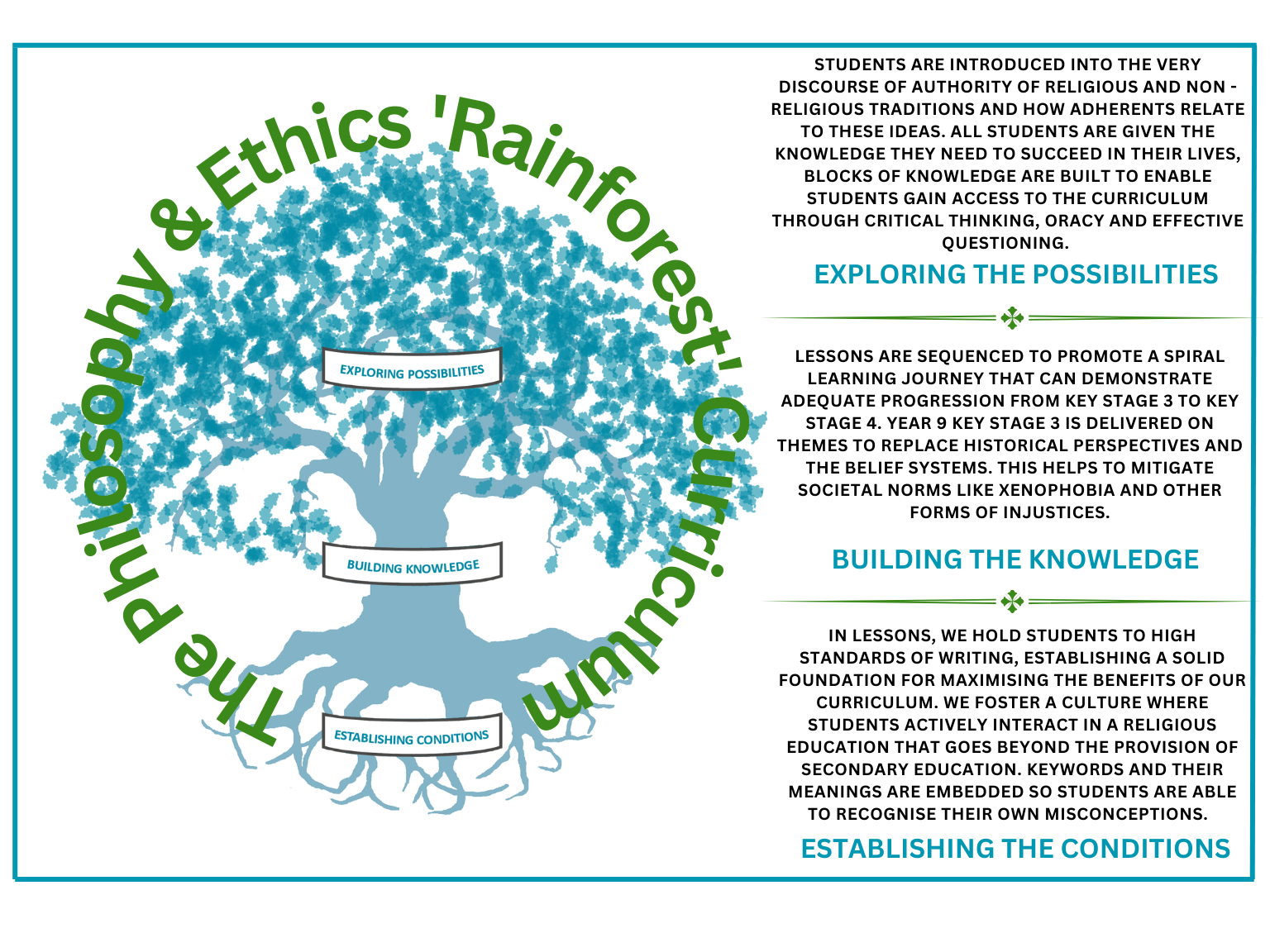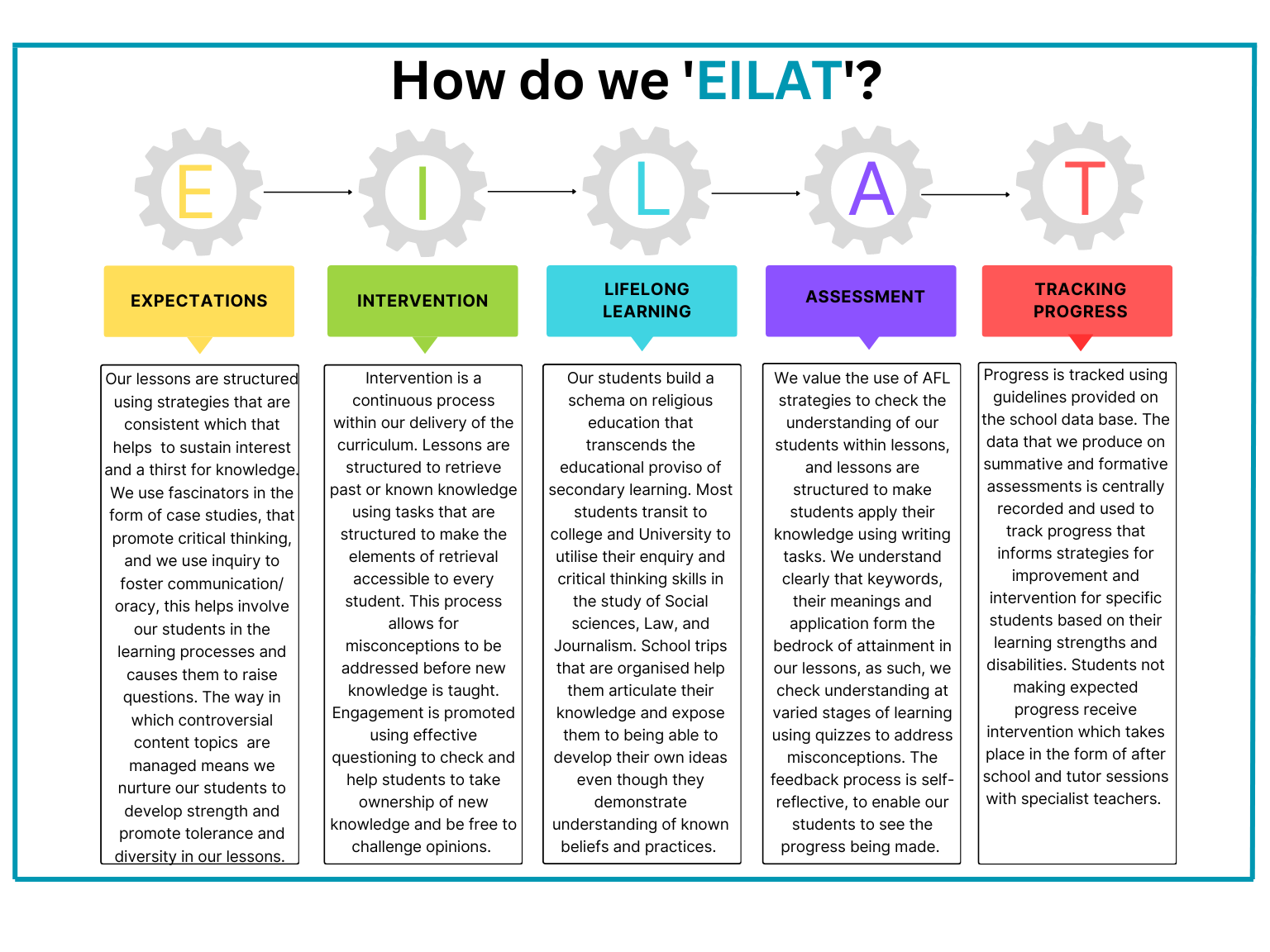- Home
- Curriculum
- Subjects
- Philosophy & Ethics
Philosophy & Ethics
'Philosophy makes us think differently and leads to praxis that forms an informed, thoughtful person who thinks about what he/she does and why'- Marek Tesar, 2016
Intent
Philosophy and Ethics at Jubilee High School encourages pupils to learn from different religions, beliefs, values, and traditions while exploring their own beliefs and questions of meaning. It challenges pupils to reflect on, consider, analyse, interpret, and evaluate issues of truth, belief, faith and ethics and to communicate their responses. The pedagogy of this subject encourages all our students to develop their sense of identity and belonging. It enables them to flourish individually within their immediate communities and as citizens in a pluralistic society and global community.
Through their study of Philosophy and Ethics, we aim to:
- Enhance students' exploratory skills so that they are able to discuss issues of faith that will enable them to develop a philosophical mind.
- Provide students with the means to build diverse views that open discussion towards the traditional and historical values of Great Britain.
- Support students in adopting the skills for enquiry, reflection, analysis and critical thinking. These skills can be used to justify views, as well as, showing respect for other people’s opinions. Furthermore, they can reflect on their own values opinions and attitudes in their own learning.
- Expose students to philosophical debates with special focus on ethical considerations.
- Equip students with the skills they will need to continue to develop their philosophical understanding within the society.

Meta-concepts
The following meta-concepts underpin our curriculum:
- Historical Perspectives: This is a way of looking at the past , that considers the context and values of the people and the events that shaped it . It involves understanding the social, cultural, intellectual and emotional settings that influenced people's lives and actions. It also involves recognising that different historical ideas have different interpretations which are affect modern ideas.
- Identity: This refers to the qualities, beliefs, personality, looks and expressions that make a person or group. It can also be defined as the fact of being who or what a person or thing is.
- Beliefs and Practices: This represents the ways we try to make sense of and bring order to the world. Our beliefs and attitudes towards life impact how we act and behave. A belief is a thought we claim to be true. People’s beliefs play an important role in their lives, shaping thoughts, actions and decision. They can also influence relationships with others, as well one’s overall sense of self.
- Morality: This represents the different intentions decisions and actions based on good, bad, right or wrong decisions or thoughts.
- Society: Refers to the community of people living in a particular country or region and having shared customs, laws, and organisations.
- Multiculturalism: This refers to the presence of, or support for the presence of, several different cultural or ethnic groups within a society.
- Arguments: Implies a reason or set of reasons given in support of an idea, action or theory, different opinions are shared.
- Contemporary World: It deals with problems and issues related to the environment, population, wealth, power, tensions and conflicts.
Philosophy & Ethics curriculum sequence
Implementation
Key Stage 3
At Key Stage 3, our students are introduced to philosophical modes of enquiry, religious and non-religious belief systems, such as atheism. They are given the opportunity to develop subject specific skills which will enable them to express viewpoints and beliefs clearly, whilst listening to and respecting those of others in response to materials studied. They use relevant information to make links between different religions, explore similarities and differences and they back up their findings with ideas and evidence. This enables them to understand how beliefs and practices affect the lives of adherents, and they are emboldened to use sacred texts to exemplify beliefs and practices. The drive through knowledge is achieved by the creation of a learning journey from authority to being able to make judgements about what is wrong or right relating to moral and ethical teaching drawing on religious and non-religious belief systems.
Year 7- Year 7 students explore the significance of the Bible for Christians and its wider impact on western culture. They derive the skill for examining the different interpretations within historical, cultural and contemporary contexts. This helps them to review known and unknown practices , and it equips them with research methods that can facilitate their deep understanding of how beliefs impact on lives of adherents. These skills are utilised to understanding other religions, like Judaism.
Year 8- Year 8 students use different methods of enquiry to accurately express Islamic beliefs and practices plus analyse the significance of Muslim history and culture. They explore and critically evaluate the overlap between religion and science, plus use philosophical concepts to explain experiential and emotional phenomena of religions against atheist consideration of ultimate questions. Moral and ethical concern about the environment is explored and personal views are compared with other's views and insights appropriately.
Year 9- The year 9 curriculum helps with the transition into the GCSE components of the curriculum. Students are involved in the critical evaluation of beliefs from the six religious points of view. Themes are explored with depth and coherence is applied to understanding the inter relationships that exists between different religious perspectives. Ethical issues are studied with a view to empowering them with structured analysis, arguments and debates on moral and contemporary ideas.
Key Stage 4
Students study the OCR specification over three lessons a fortnight in both year 10 and 11.
Year 10 and 11- Takes the form of exploring the contents and contextual demands of the OCR GCSE component on Religion, Philosophy and applied Ethics. Students also engage with dialogue on the influence of the monarchy on religion, and they explore the responses set out from humanist, secular agnostic and Atheists points of view.

GCSE specification- Philosophy & Ethics
Impact
Our curriculum equips our students with the opportunity to progressively recognise the diversity that exists within and between religions and non-religious concepts and ideas. The curriculum is delivered to promote oracy with an enrichment of literacy and philosophical reasoning. Our students are able to embrace knowledge of recent developments that can promote social harmony and at every stage of their learning, they achieve an enquiry mind through contemporary research and misconceptions are diligently addressed in a manner that promotes understanding of varied points of view. Creative thinking and critical thinking skills have been outstanding benefits to students through a rigorous learning journey from year 7 to year 11.



